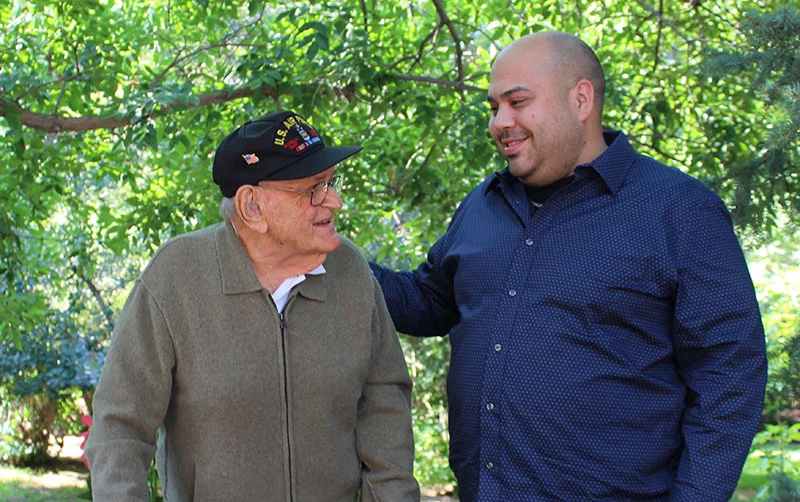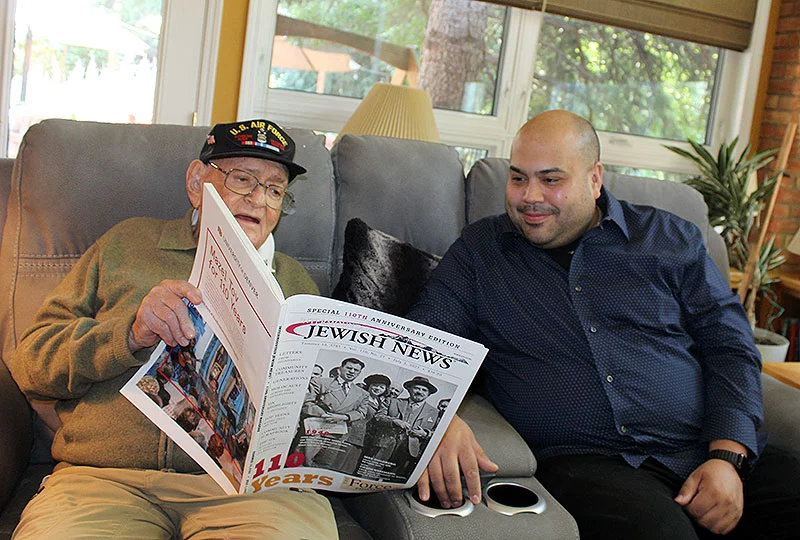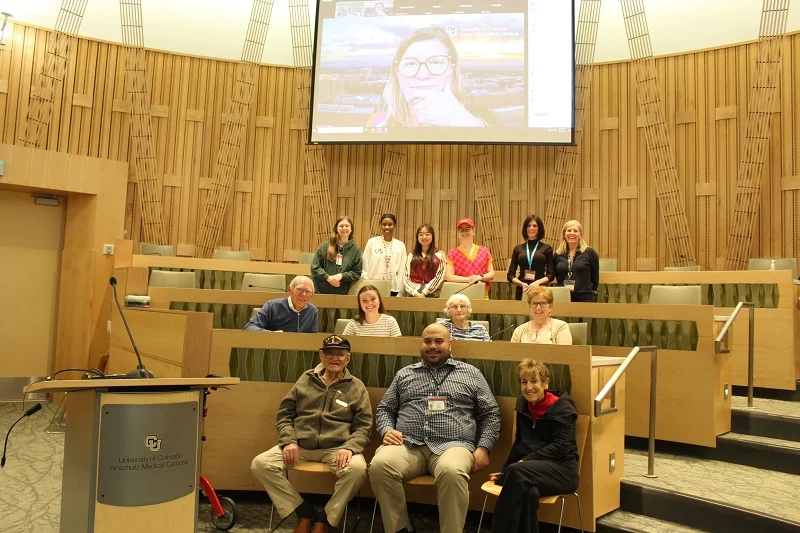
In the comfort of his home, Bernie Rogoff, 95, awaits a call from Michael Foresman, 34.
A 60-year age gap separates the two men, but Bernie describes their friendship as “candid and honest.”
‘‘Michael calls me, and I look forward to his phone calls. We sit down and chat. I ask him about his dad and how he is doing and so forth,’’ Bernie said, reflecting on the year he has spent getting to know Michael.
Despite their multi-generational divide, Michael and Bernie share common perspectives and experiences, including an interest in health care.
Bernie volunteered at age 17 to join what was then called the U.S. Army Air Force and later became the U.S. Air Force. His older brother had served in Europe during World War II and advised Bernie to do something “medical.” So, Bernie became a medic and specialized in radiology. He later enjoyed a successful career in the clothing manufacturing business. He also has served as a lifelong advocate for veterans, got to know former President Barack Obama as a campaign volunteer and supported efforts to build the new Rocky Mountain Regional VA Medical Center in Aurora.
Michael is studying to become a pharmacist at the Skaggs School of Pharmacy and Pharmaceutical Sciences on the University of Colorado Anschutz Medical Campus.
The men met through a program that experts on elder care at the University of Colorado School of Medicine developed during the COVID-19 pandemic to tackle the loneliness epidemic. (Learn more about how social connections are vital to healthy aging.) The program is called Connecting Older Adults to Students Through Interprofessional Telecare or COAST-IT.
COAST-IT pairs CU Anschutz Health Profession students with older adults to foster social interactions, reduce loneliness, improve health and give students an opportunity to learn from people with decades of wisdom.
“Older adults carry a lifetime of stories — triumphs, challenges, and wisdom hard-earned. When they share these experiences, they offer younger generations a powerful lens into the future and a deeper understanding of how to live with purpose, resilience, and empathy” said Jodi Waterhouse, director of strategic partnerships and programs at the University of Colorado Multidisciplinary Center on Aging, the entity where leaders created the COAST-IT program five years ago.
Friendships formed through the program have endured, boosting the health and longevity of older adults, reducing loneliness and enriching the lives of the young participants as well.

Combating a loneliness epidemic among older adults
Young people who are embarking on a variety of health careers at the Anschutz Medical Campus chat with their older adult partners on the phone at least twice a month and meet in person whenever it is convenient for the participants.
For Bernie and Michael, the friendship enriches both men’s lives.
Michael likes talking to Bernie about the challenges pharmacists face these days, such as ensuring medications are safe and helping patients stick with treatments. Through their conversations, Michael has gained insights about improving patient safety and treatment outcomes.
‘‘I like having someone who’s outside of my world who I can relate to. Bernie is an incredible person, and he is an inspiration. We share our stories, and getting to know him means the world to me,’’ said Michael.
Bernie has lived a rich, full life, but his friendship with Michael staves off loneliness and keeps him connected with young people and a world he always loved: health care.
“Today we pursue our activities without looking to find other friendships. Sharing, talking and being in touch with each other, that’s the essence of life, but it’s a lonely world out there,’’ Bernie said.
In Colorado, about 38% of people reported feeling lonely at least some of the time, according to a 2024 U.S. Census Bureau survey. Nationally, about 40% of people say they feel lonely at times.
Deep loneliness can be as harmful as cigarette smoking
Experts have learned in recent years how dangerous social isolation can be.
‘‘Loneliness equates to smoking 15 cigarettes a day. If people feel very socially isolated and or feel lonely, that is a significant health issue, not only mentally, but also physically,’’ Waterhouse said.
She said the data about loneliness and social harm comes from a meta-analysis — a study that analyzed 148 studies with 308,849 participants — and explored the effects of social relationships on mortality.
A recent report from the U.S. Surgeon General also highlighted how vital friendships are.
“Social connection is a fundamental human need, as essential to survival as food, water, and shelter,” researchers found in the 2023 report, Our Epidemic of Loneliness and Isolation.
The secret to a good friendship

Another duo who met through the program is Jill Hueckman, 45, and Glenda Mapp, 72. Their bond has flourished since the beginning of 2025.
“Jill accepts me for who I am. She doesn’t try to change me into being someone I am not,’’ said Glenda, who used to own a pet grooming business.
Now retired, she loves caring for her two cats and two guinea pigs, whom she trains to perform tricks.
Jill is working on her doctorate in pharmacy at the Skaggs School of Pharmacy and Pharmaceutical Sciences and is set to graduate in 2027. Her friendship with Glenda has provided Jill with valuable insights on the importance of being a good listener, a crucial skill for any health care provider.
“She had an amazing life and loves to talk about it, and I think she’s a fun person to be around. I realized how much I learned just from hearing her struggles and challenges,’’ Jill said of Glenda.
Jill joined the program to grow professionally and help her achieve her goals. She also loves the social component of COAST-IT.
“In the end, if you do this profession, you’re here for the people. I had worked with older people in a nursing home and for a nonprofit organization with adults with developmental disabilities,’’ she said.
How do strong relationships improve health?
Strong social connections are as fundamental to human beings as shelter and food, as they are directly connected with health outcomes, said Samantha Farro, a psychologist at the UCHealth Seniors Clinic on the Anschutz Medical Campus.
‘‘Researchers have demonstrated that in the absence of adequate relationships, social connection, and support, humans are at greater risk for a myriad of health issues and even earlier death,’’ Farro said.
“Interpersonal relationships are considered an essential and basic need for humans. They are incredibly impactful to our physical and mental health,” she said. “Social connections can improve immune functioning, reduce the risk of chronic diseases, and even lower mortality rates.”
Conversely, loneliness and social isolation can increase the risk of heart disease, stroke, Type 2 diabetes, depression, anxiety and dementia, Farro said.
Loneliness often worsens as people age.
‘‘Lack of transportation or difficulty accessing transportation, inability to leave home without help, a major life change, such as retirement, a break-up or divorce, living in a rural, unsafe, or hard-to-reach neighborhood, and language barriers, are among the risk factors of social isolation and loneliness,’’ Farro said.
Friendships that pair younger and older people boost both physical and mental health

More than 750 older adults, like Bernie and Glenda, have discovered the beauty of intergenerational friendship, grounded in empathy and respect.
“Participating in the COAST-IT program creates intergenerational social connection benefits for older adults. It equates to keeping physically and mentally active. And so, at the end, being much healthier,’’ Waterhouse said.
For Bernie, talking with Michael and keeping his mind active by sharing memories of his life is crucial to staying healthy and happy.
‘‘Michael has come into our lives and has participated in a way that I would want all people to share and talk and be with each other,” Bernie said.
COAST-IT is recruiting more community older adults to be paired with CU Anschutz Health Professions, beginning this fall semester. Learn how to join COAST-IT.
Listen to Bernie Rogoff as he shares his life story in this podcast.
How can older people enhance their social connections
To cultivate meaningful connections, consider these recommendations from experts at the U.S. Department of Health and Human Services and the US Centers for Disease Control and Prevention CDC.
Embracing these strategies can enrich your relationships and enhance your overall well-being:
- Make time in your routine to contact others.
- Join a group with shared interests to create a sense of belonging.
- You can join a social club to meet new people, engage in shared interests, and participate in activities.
- Get involved in community service.
- Stay informed about events in your town and attend the ones that interest you. Arrive early to interact with the early birds.
- Stay in touch with people, such as former co-workers, neighbors and classmates.
